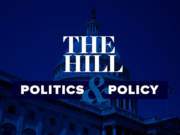This piece originally appeared in the Washington Examiner on November 20, 2023.
In 2008, Citizens United, an incorporated, conservative advocacy group, was prohibited from paying to advertise or air a documentary movie critical of Hillary Clinton, at the time the front-runner for the Democratic presidential nomination. The reason was a 2002 law prohibiting corporations from paying for communications that even mentioned candidates for federal office. Citizens United sued, and eventually, in January 2010, the U.S. Supreme Court ruled that corporations have a right to advocate the election or defeat of candidates.
The illiberal Left reacted to the decision in Citizens United v. Federal Election Commission with hysteria. Russ Feingold, then a senator from Wisconsin, called the decision “lawless.” MSNBC commentator Keith Olbermann wailed that Citizens United was “our Dred Scott.” A New York Times editorial lamented that the decision would “thrust politics back to the robber-baron era of the 19th century.” At the State of the Union address one week later, then-President Barack Obama made an unprecedented attack on the Supreme Court for its decision. But conservatives cheered a landmark victory for free speech.
Yet now, Sen. Josh Hawley (R-MO), a self-proclaimed “conservative,” has joined the effort to reverse Citizens United, putting him in the company of lawmakers including socialist Sen. Bernie Sanders (I-VT). Hawley has introduced the so-called Ending Corporate Influence on Elections Act to prohibit publicly traded corporations from supporting or attacking federal candidates in an effort to “hold mega-corporations’ feet to the fire and stop their dollars from buying our elections.”
The obvious problem with Hawley’s bill is that it is unconstitutional. Citizens United holds that “the First Amendment does not permit Congress to make … categorical distinctions based on the corporate identity of the speaker and the content of the political speech.”
Because the bill restricts only publicly traded corporations, some suggest it could survive the constitutional scrutiny that the broader ban on all corporations did not. But nothing in Citizens United limits its reach to large or for-profit corporations. In fact, one prominent amicus curiae in the case suggested that the court strike the corporate speech ban only as applied to not-for-profit entities, but the justices declined to do so. And Citizens United, though itself a nonprofit organization, accepted contributions from for-profit corporations.
Hawley isn’t being coy: He says that he wants to silence these corporations because he disagrees with their speech, arguing that “corporate America has funneled billions of dollars into elections in favor of politicians who favor their woke, social agendas — instead of American voters’ interests.” Curiously, Hawley would not extend this speech ban to unions, which Citizens United also freed to make independent election expenditures and which overwhelmingly support Democrats, the party of “woke, social agendas.”
But Citizens United was rightly decided. There is no “free speech for me but not for thee” clause in the Constitution.
Hawley’s approach also undermines the culture of free speech that is necessary to protect our rights in the long term. One reason free speech is under such assault on our college campuses, for example, is that it has become acceptable to argue that some speakers — for Hawley, apparently, it is large corporations — are just too dangerous to be allowed to speak. But American citizens have a right to hear arguments for and against candidates, even when they come from corporations.
Finally, even if one endorses Hawley’s approach, he is simply wrong as a matter of fact. Dollars don’t “buy our elections.” For example, Hawley’s ally, former President Donald Trump, was elected in 2016 despite being vastly outspent by Hillary Clinton. Michael Bloomberg’s billion-dollar 2020 presidential campaign went nowhere. Spending can get one heard, but it doesn’t mean people will vote for you.
Moreover, publicly traded corporations have not “funneled billions … into elections.” Since Citizens United, for-profit corporations have accounted for approximately 2% of total political spending. The true beneficiaries of Citizens United have been nonprofit, citizen advocacy groups such as Moms Rising Together, Gun Owners of America, and Citizens United itself.
Publicly traded corporations are not much interested in participating in election campaigns. To the extent that some corporations might have a “woke agenda,” it is generally implemented through lobbying (think Disney in Florida), marketing (which can backfire, as when Budweiser partnered with Dylan Mulvaney), and internal human resources policies (such as mandatory DEI training).
Citizens United was a hard-fought victory for free speech. The public, liberal or conservative, would be foolish to throw it away.














